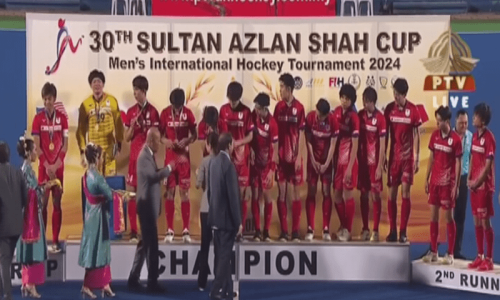
ISLAMABAD: Pakistan’s civilian government issued visas to more than 400 Americans without army security clearances starting in early 2010, possibly enabling the CIA to boost its presence, in a move that angered the country's powerful military.
Details of the visa decision emerged after US Navy SEALs killed Osama bin Laden in his compound in the garrison town of Abbottabad on May 2, straining already uneasy ties between strategic allies Islamabad and Washington.
The granting of the visas has also fueled tension between the military and the unstable nuclear-armed country's civilian leaders, whose relations are uneasy at the best of times.
Pakistani cooperation is crucial for US efforts to combat militants and bring stability to Afghanistan.
But the United States has had doubts about Islamabad's commitment and, given the contacts that Pakistan's spy agency has had with militants in the past, almost certainly uses its own operatives to collect intelligence in the country.
Pakistani diplomatic missions in Washington, the United Arab Emirates and London issued the visas after the government came under intense US pressure, officials said.
“At the end of 2009, a special presidential order was issued to give 7,000 visas and the same order was passed through the prime minister's office to Mr. Haqqani,” a senior Pakistani security official told Reuters, referring to Pakistan's ambassador in the United States, Husain Haqqani.
“On the basis of these orders, the visas which were valid for three to six months were issued without the scrutiny or routine security clearance of the ISI (Inter-Services Intelligence).”
The ISI is the military's main spy agency. About 450 of those visas were issued to the CIA, the security official said.
A senior official at the Pakistani Embassy in Washington said the embassy had received no complaint from any branch of the Pakistani government regarding the government's official visa policy.
A spokeswoman for President Asif Ali Zardari declined to comment on details of the visa decision, saying only that security clearance was not always needed from the army.
The army did not respond to a request for information on the visas, but a senior security official said, “We lost control of CIA operatives in Pakistan.”
Army generals, who have ruled Pakistan for more than half of its history, largely direct security and foreign policy even when civilian administrations are in power, as is the case now, and they do not like to be challenged on those agendas.
Military Hopping Mad
Ties between the United States and Pakistan reached a low point this year after Raymond Davis, a CIA contractor and former US special forces member, shot dead two Pakistanis in the city of Lahore in January.
Davis, who said he acted in self-defense, was freed in March after “blood money” - compensation to the families of those killed - was paid.
Ayesha Siddiqa, author of “Military Inc,” a book on the military's economic might, said it was clear why army chief Ashfaq Kayani and the head of the ISI were “hopping mad” over the Davis case.
“Because somebody in the Pakistani political government had allowed X number of CIA operatives to come into Pakistan and set up parallel operations to sneak into what was going on,” she told Reuters.
A second security official said the military was angered by the move and as a result the number of Americans in the country who had received the visas had been reduced by 50 percent. But those who remained were cause for concern.
“This will affect the already tense relations between the two countries. This indicates the lack of trust and mutual understanding, which will ultimately benefit the militants and extremist elements inside Pakistan,” he said.
“They (the security establishment) lost track of most of the people who came in. Their missions were not clearly stated.”
A former Interior Ministry official said it had been bypassed as well when the visas were issued. Haqqani said the issue had been blown out of proportion.
“Also, the 7000 figure is incorrect & official records prove hype on subject is totally fabricated. All procedures followed,” he said on his Twitter page on May 8.
The US Embassy declined comment on suggestions the visas may have enabled the CIA to expand its presence in Pakistan, which receives billions of dollars in US military aid.
“We submit full and complete visa applications to the government of Pakistan. We comply in providing the information requested,” said an embassy spokeswoman.
US officials have complained in the past about hundreds of Pakistani visa delays, saying this could hamper aid intended to stabilize the Islamabad government and help Pakistanis.
Islamabad has cut by more than half a visa backlog affecting US officials and contractors needed to run American aid programs aimed at combating extremism there, a State Department official said in March of last year.











































Dear visitor, the comments section is undergoing an overhaul and will return soon.